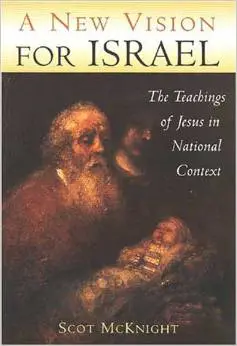

A New Vision for Israel: The Teachings of Jesus in National Context (Studying the Historical Jesus)
Pages
278
Publisher
Eerdmans
Published
2/26/1999
ISBN-13
9780802842121
The most important development in recent historical Jesus studies is the attempt to understand the ministry of Jesus in "political" terms. In calling the nation of Israel to repentance, Jesus served as a national prophet concerned with the salvation of Israel. Scot McKnight furthers this line of inquiry by showing how Jesus' teachings are to be understood in relation to his role as a political figure. McKnight looks closely at Jesus' teachings on God, the kingdom, and ethics, demonstrating in each case how Jesus' mission to restore Israel brings his teachings into a bold new light.
Reviews
Grand Rapids: Eerdmans, 1999. Pp. xiv + 263, Paperback, $21.00, ISBN 0802842127. Walter Pilgrim Pacific Lutheran University Tacoma, WA 98447 This study, a volume in the series Studying the Historical Jesus edited by Bruce Chilton and Craig A. Evans, makes a significant contribution to the plethora of recent approaches to the historical Jesus. As the title suggests, the author concentrates his scholarly vision on Jesus’ mission to Israel, understood within a national context. By national (or political) context, McKnight means what Jesus taught about the salvation or judgment of Israel. What makes this book both refreshing and at the same time problematic is the insistence that Jesus’ whole ministry and dying were focused on the fate of Israel and the end-time events of 70 C.E. Chapter one provides a helpful sketch of the author’s interpretation of the vision of Jesus for Israel. Both John and Jesus seek the restoration of Israel and issue a similar call for national repentance in view of the coming judgment. This shared message of John and Jesus is reiterated throughout the study. Jesus sees himself in some sense as the Messiah and the final eschatological prophet. In light of his conviction that Israel must repent in order to avoid the imminent disaster (70 C.E.), McKnight even thinks Jesus offered himself as a vicarious sacrificed for his nation. For the author, this political vision permeates all of Jesus’ teaching about God, the kingdom, and ethics. In chapter two, the God of Jesus, we find a thorough and illuminating discussion of this oft-neglected topic. The God of Jesus is the God of Israel, whom Jesus discloses as both inflexibly holy and relationally loving.
[Full Review]
Grand Rapids: Eerdmans, 1999. Pp. xiv + 263, Paperback, $21.00, ISBN 0802842127. Jeffrey S. Siker Loyola Marymount University Los Angeles, CA 90045 This book appears in the Studying the Historical Jesus series edited by B. Chilton and C. A. Evans. McKnight seeks to "present how the teachings of Jesus are to be understood in light of his mission to Israel" (p. viii). McKnight's earlier book, A Light Among the Gentiles: Jewish Missionary Activity in the Second Temple Period (Minneapolis: Fortress, 1991), provides a significant springboard for the present study, which highlights the national political context of early Judaism for understanding Jesus' ministry. McKnight divides his study into six major chapters: (l) The Vision of Jesus: A Preliminary Sketch; (2) The God of Jesus; (3) The Kingdom Now Present; (4) The Kingdom Yet to Come; (5) The Ethic of Jesus: Conversion and Cost; and (6) The Ethic of Jesus: Morality. The "vision of Jesus" is cast primarily in political terms revolving around the restoration of Israel. McKnight asserts as the basis for his study "that Jesus thought of himself as in some sense king, messiah, and prophet" (p. 6). He also uncritically asserts the historicity of the Markan passion predictions, namely, that Jesus saw himself as the Son of Man called to suffer and die as a "national sacrifice," whom God would vindicate by raising him from the dead. Nowhere does McKnight seriously entertain the possibility/probability that such notions most likely resulted from early Christian theologizing about the death of Jesus after the fact, rather than coming as such fully-developed theological constructs out of the very mouth of the historical Jesus himself. Much better is McKnight's description of "the God of Jesus.
[Full Review]
